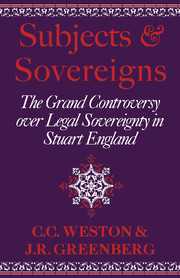Book contents
- Frontmatter
- Contents
- Dedication
- Preface
- 1 The shift in political thought
- 2 The keeper of the kingdom
- 3 The new age of political definition
- 4 That ‘Poisonous Tenet’ of co-ordination
- 5 The curious case of William Prynne
- 6 The idiom of restoration politics
- 7 Co-ordination and coevality in exclusion literature
- 8 The law-makers and the dispensing power
- Appendix: Co-ordination and resistance at the Revolution
- Notes
- Bibliography
- Index
6 - The idiom of restoration politics
Published online by Cambridge University Press: 08 October 2009
- Frontmatter
- Contents
- Dedication
- Preface
- 1 The shift in political thought
- 2 The keeper of the kingdom
- 3 The new age of political definition
- 4 That ‘Poisonous Tenet’ of co-ordination
- 5 The curious case of William Prynne
- 6 The idiom of restoration politics
- 7 Co-ordination and coevality in exclusion literature
- 8 The law-makers and the dispensing power
- Appendix: Co-ordination and resistance at the Revolution
- Notes
- Bibliography
- Index
Summary
When Charles II entered London on May 29, 1660, he could contemplate ruling a people who lauded the kingship and exalted royal authority. The powerful current of opinion running for the monarchy submerged any thought of formally imposing conditions on the restored monarch. Yet the co-ordination principle, with all of its restraints on the monarchy, was assuredly well-known at the time and widely received. On the eve of the king's triumphal entrance the convention parliament resolved, on May 1, 1660, that ‘according to the ancient and fundamental laws of this kingdom, the government is, and ought to be, by king, lords, and commons’.
This language had originated in the traditionally more conservative house of lords; and its speaker, the earl of Manchester, subsequently recommended its adoption successfully at a conference of the two houses. That he should have done so was consistent with earlier phases of his political career. A leading member of the middle party in the long parliament when its leaders sponsored Herle as author of the indispensable co-ordination principle, he was also on record as having used the language of mixed monarchy to oppose the ordinance for Charles I's trial. At that time, too, he was speaker of the house of lords. The convention parliament's resolution was based on the same view of the constitution.
Yet the famous resolution enjoyed a broader basis of support than this description suggests.
- Type
- Chapter
- Information
- Subjects and SovereignsThe Grand Controversy over Legal Sovereignty in Stuart England, pp. 149 - 181Publisher: Cambridge University PressPrint publication year: 1981



